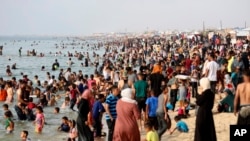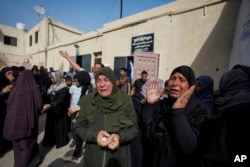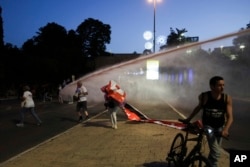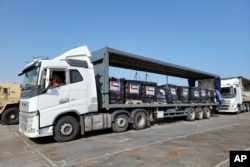A senior U.N. humanitarian official said Monday that more than 800,000 Palestinians have been displaced from the southern Gaza city of Rafah since Israel began its ground offensive there two weeks ago.
“Today, the once overcrowded camps and emergency shelters in Rafah have now largely emptied, with the majority of the displaced seeking refuge in Khan Younis and Deir al-Balah,” Edem Wosornu, U.N. director of operations and advocacy for the office of humanitarian affairs, told a meeting of the Security Council on the situation.
She said the conditions at the displacement sites they are arriving at are “horrendous,” lacking adequate toilets, clean water, sewage and shelter.
“These appalling conditions leave serious doubt as to the compliance with these basic obligations.”
Wosornu said the United Nations and its partners are struggling to offer the displaced assistance, because they cannot get supplies into Gaza at the scale required.
Israel’s envoy said it is “truly terrible” that civilians in Rafah have to be evacuated, but the move should be supported, not condemned.
“They have moved to a designated humanitarian zone that is being filled with aid,” Ambassador Gilad Erdan told the council of the Israeli-designated sites. “And our hope is for many more civilians to leave Rafah and move out of harm’s way.”
He said Israel is advancing its military operation in Gaza “slowly and carefully” to avoid civilian casualties, but that the operation must be done. Otherwise, he said, Israel would be granting immunity to the remaining Hamas terrorists in Rafah.
The Palestinian envoy accused Israel of ignoring international calls to spare Rafah and of forcibly displacing its population.
“People were forcibly displaced time and time again in horrific conditions,” Riyad Mansour said. “They are being displaced yet again by the hundreds of thousands, with nowhere to go, nowhere to stay, nowhere to be safe — dragging what remains of their lives, confronted with death all around them, abandoned to this terrifying fate.”
The Security Council, the United States and many other countries have urged Israel not to enter Rafah because of the likelihood of high civilian casualties.
Ambassador Robert Wood reiterated Washington’s “ironclad commitment” to Israel’s security but said despite “clear and consistent warnings” from the U.S. and others, Israel’s preparations to meet the needs of the displaced are insufficient.
“Israel should take immediate and decisive actions to remedy this situation and ensure protection of civilians,” Wood said. “There must be no delay. Lives depend on it.”
Aid crossings
Wood said that included immediately reopening the Rafah border crossing.
As of Monday, the main humanitarian crossing at Rafah remained closed. The Israel Defense Forces took it over on May 7, a day after launching its ground operation into eastern Rafah, and no aid trucks have crossed it since.
The U.N.’s Wosornu said 82,000 metric tons of food and medical supplies are stranded and spoiling on the Egyptian side of the border, waiting to cross.
The Kerem Shalom crossing is operational, but Wosornu said there is only limited access. While a new crossing into the north, known as Erez West or Zikim, is now being used for limited quantities of aid, humanitarians are not sure how much longer it can be used, since it falls within the vicinity of recent Israeli evacuation orders.
Wosornu noted that 10 of 16 U.N.-supported bakeries will run out of stock and fuel within days if no additional supplies come in. She said another six in southern Gaza have stopped working, either because of fuel shortages or active fighting.
Meanwhile, a $320 million U.S.-funded and -constructed floating pier off Gaza began receiving aid on Thursday, but only 10 truckloads have come through it since Saturday, a U.N. spokesperson said.
Fuel supplies also remain dangerously low, limiting the movement of aid convoys.
Humanitarian assistance into Gaza is particularly urgent, as the U.N. says 1.1 million Palestinians face catastrophic levels of hunger and parts of Gaza are on the brink of famine.







